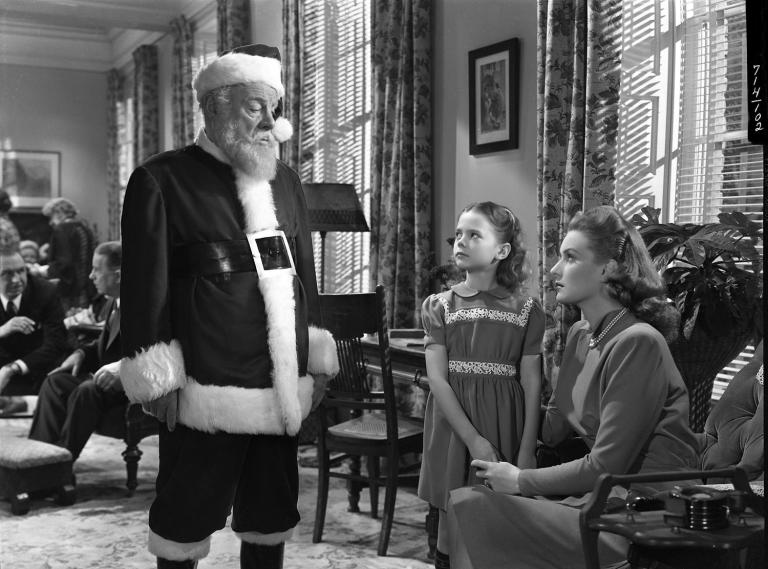
This year, we marked the 175th birthday of A Christmas Carol. Yesterday, we marked the 72nd birthday of another Christmas institution. Three generations have now grown up with It’s a Wonderful Life. The story of George Bailey is a story with more layers than you would think, about more than you would think. It’s a story about duty. It’s a story about depression. It’s a story about human dignity. Ultimately, it’s a story about home.
Young George is restless, ambitious, impatient to shake the dust of his home off his feet. Then, slowly, one by one, he lays his dreams to rest. There is joy to be found in his life, to be sure, but not the kind he ever expected. Day by day, year by year, it requires a continual outpouring, an emptying of himself, until the disaster that leaves him believing there is no more of himself left to give. It is here that we find him, on Christmas Eve (of all eves!), the best of men, contemplating the unthinkable.
I re-discovered this film with fresh eyes in my senior year of high school. The last author I had studied in my literature course was T. S. Eliot. We finished off with his Four Quartets, and “Little Gidding” was burning especially bright in memory.
Thus, for the millionth time, I wept, exulted and triumphed with George Bailey. Once again, I followed his Dickensian progression through an alternate, George-less reality, culminating in the revelation that life, in its essence, is wonderful.
I laughed at the ending sequence where he careens giddily through Bedford Falls, nearly slipping and falling in his excitement as he calls out a Christmas greeting to anyone with ears to hear. I watched him shower Mary’s face with kisses and blunder down the stairs with all his children in tow, giggling like a man who knows a great secret. And all at once, I understood what Eliot meant when he wrote these words: “We shall not cease from exploration./And the end of all our exploring/Will be to arrive where we started/And know the place for the first time.”
Even now, I close my eyes and see Christmas on my street. I see our party of carolers, tramping and panting through the neighborhood. I see the children scooping up and eating caked masses of snow. I see the old man in slippers and a robe, bobbing along with his bald head. “I like ‘em all! They’re all good, right?”
These are shades of Christmas present. I look again and see the shades of Christmas past. I see the old man elbowing his way past his grown children to open the screen door and join us on his porch step. What was it we were singing? Was it “Angels We Have Heard On High?” “O Come All Ye Faithful?” I can’t remember. I only remember how he listened as we sang.
I see the soldier of the Second Great War and his wife in the next house over. I see the widow bent over double, offering us chocolate truffles with raspberry riches inside. They left my street years ago, and yet I see them still.
I leave my street and take the highway to a country road. I follow it through a sleepy town to a forgotten nursing home. They say carolers always miss this one. A few of us try to remedy that. We visit the widow there sometimes, she of the chocolate truffles. She still remembers who we are. We walk the halls and catch glimpses of some who remember less. One woman lies silent and crumpled, trembling slightly. Another woman sucks her finger, occasionally letting out a long, loud, goat-like bleat.
We walk slowly. We pause sometimes, seeing motion in the corner of our eye. Someone in a room is sitting up. Someone is taking a tentative step to the door. Someone’s lips are moving soundlessly. Someone closes his eyes in tears, overcome by “Silent Night.” “Sleep in heavenly peace. Sleep in heavenly peace.” We sing “Hark the Herald Angels Sing” outside one room, and from another room floats an aggressively, infectiously off-key voice joining itself with ours. “Born to raise the sons of Earth. Born to give them second birth.”
Thus the fabric of our lives is woven, each with its own pattern of timeless moments. It is the drawing of the same love, the voice of the same calling that leads us onward, as it leads George Bailey. It is the bannister knob that never did know its place. It is an endlessly practiced “Hark the Herald” finally coming out just right under small, determined fingers. It is the brother home from war, throwing his head back with laughing eyes, singing loud and long and lustily as young men do. It is the taxi driver who stands just behind to clap him on the shoulder. It is the fixed point in the turning world. It is “quick, now, here, now, always,” where all manner of thing is very well.
So George makes his beginning. So the poet makes his. So I make mine. And so we all come home, to know it for the first time.













